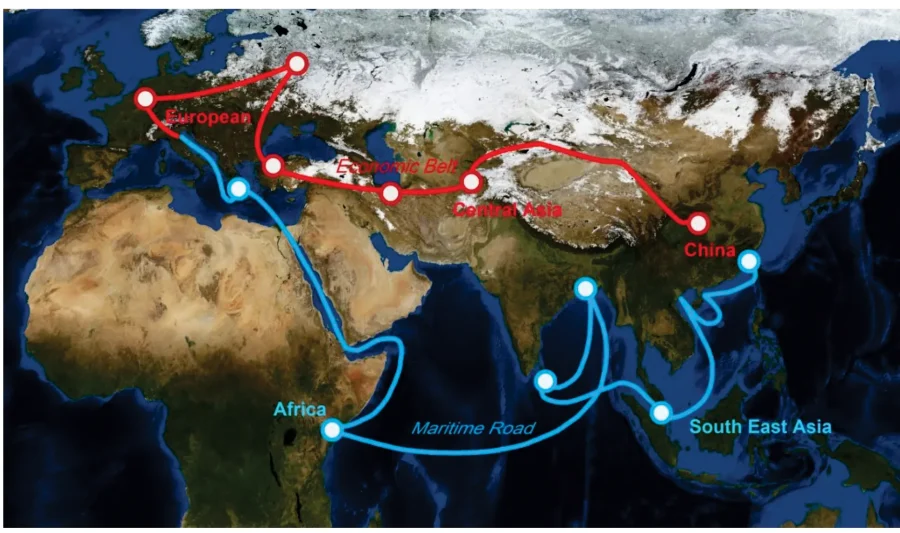China-Gulf economic cooperation: A new trajectory for BRI
ENCRYPTING President Xi Jinping’s vision of win-win cooperation and a community with a shared future in the historic China-Arab Summit and the China-Gulf Cooperation Council Summit held in early December last year in Riyadh, the People’s Republic of China and Gulf States embarked on a new level of strategic partnership. These summits, attended by 10 Arab leaders, are considered a landmark in the history of Sino-Arab relations, paving the way towards an era of a more promising future of sustainable cooperation, consolidated solidarity and enhanced economic development.
The Arab States and China, historically connected by the ancient Silk Road, find an excellent opportunity in the Belt and Road Initiative to enhance cultural engagements, bolster trade and innovation and ensure all-inclusive peace and development. According to Xi’s vision, BRI will help translate these aims by creating a stronger China-Arab community with a shared future. The multilateral rendezvous via BRI is acclaimed as a game changer, as the whole Gulf region will benefit from it.
The China-Gulf partnership has increased since BRI’s 2013 launch. China’s Belt and Road Initiative’s partnership priorities—unrestricted trade, financial integration, facility connectivity, people-to-people linkages, and policy coordination—fit the PRC-Gulf States relationship. BRI aims to improve infrastructure, logistics, energy supply, hydrogen supply chains and renewable energy capacity while boosting investment and commerce. China’s “Economic Diplomacy” aims to grow trade and economic ties without political interference.
The “Geo-economics Approach” of China with the GCC States rests upon the pillar of economic interdependence. China, the world’s largest energy consumer, has remained GCC’s largest export market of petrochemical products, including liquefied natural gas (LNG) and crude oil. PRC has been actively strengthening its ties with the six-member countries of the GCC. The economies of Saudi Arabia, Kuwait, and Oman depend highly on their oil exports to China. Simultaneously, China has remained dependent on the Gulf countries for its energy security and Saudi Arabia alone accounted for 17.4 percent of its crude oil imports to China in 2021.
Sino-Gulf trade rose from $10bn in 2000 to $230bn in 2021. Saudi Arabia, Oman and the UAE supplied $44.9 billion, $25.4 billion and $21.3 billion of Chinese fossil fuel. GCC states offer China energy, a huge market for Chinese goods, investment possibilities in infrastructure, digital economies, manufacturing and construction contracts. China’s top non-Asia-Pacific trade location is the Gulf. Technology and facilities have tied the region’s economy to Beijing’s Belt and Road Initiative.
Conversely, GCC wants foreign direct investment inflows in the region to satisfy local demand and integrate local economies into global supply chains which these recent summits give the best chance for. Saudi Arabia and the UAE also want to create new sectors to diversify their economies and create more jobs. They are investing in new technologies to diversify their economy away from fossil fuels. Thus, for post-oil economic diversification, Gulf States are increasingly turning east. BRI promotes its most sustainable choice, China.
Given the dynamic international and regional situation, the strategic engagement of Gulf States with China is becoming more important. China-Saudi relations have reached a new era of economic interdependence. China’s Belt and Road Initiative supports Saudi Arabia’s 2030 Vision by providing a high-level framework for cooperation in the Middle East economy, trade, energy and security, regional and international affairs and the China-Saudi Arabia inclusive strategic partnership.
Additionally, according to Saudi state media, China and Saudi Arabia signed deals valued at around US$30 billion. An agreement signed over Huawei Technologies is expected to bring data centres, cloud computing and high-tech complexes to Saudi cities. Saudi Arabia has been the largest recipient of Chinese BRI investment in the Gulf region which amounted to US$5.5 billion worth of deals, manifesting Beijing’s long-term ambitions and commitments in the Middle East while detaining it from investment in other countries due to geopolitical concerns.
Saudi Arabia has seen steady growth since BRI was announced with Chinese FDI inflows and investment averaging US$654 million in 2019. Kuwait’s 2035 Vision of Development includes a China-Kuwait BRI partnership. China’s miracle inspired other Gulf economies to trust Chinese guidance for socioeconomic growth and shared progress. At the China-GCC summit, President Xi Jinping called for GCC states to cooperate in 5G and 6G communication, big data, AI, satellite and aerospace and high-tech start-ups. Twenty Arab states signed BRI cooperation agreements with the PRC, 15 joined the AIIB and 17 backed China’s Global Development Initiative. (GDI). Additionally, 17 cooperation mechanisms supported this plan.
In line with BRI cooperation, the Gulf States supported China’s Global Development Initiative (GDI) to boost their autonomous development capacity, socioeconomic progress and the UN 2030 Agenda for Sustainable Development. They also view China’s Global Security Initiative (GSI) as a proactive approach to the Middle East’s security crisis to support peace and security in the region. The BRI can improve the China-Gulf partnership and mutual learning, benefiting both sides. More Arab countries are taking advantage of BRI chances due to China’s image as a reliable Asian partner, giving this incredible initiative a new direction. These opportunities will elevate China-Arab and China-GCC relations, promoting joint growth and security, future cooperation, and civilizational dialogue.
Email: saherliaqat2000@gmail.com










